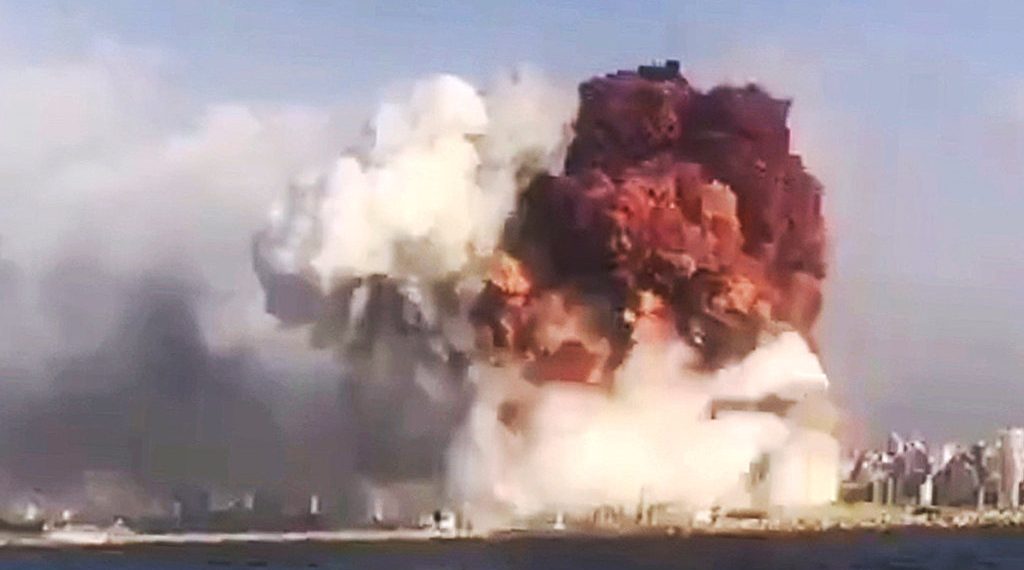Lebanon’s Parliament on Thursday approved a state of emergency in Beirut in its first session since the catastrophic Aug. 4 explosion. The approval grants the military sweeping powers amid rising popular anger at official corruption and mismanagement and political uncertainty. The Beirut blast helps Hezbollah turn Lebanon into a mini Syria. With all the accoutrements of a police state ready to brutalize its people.
The Parliament’s aim, as well, is to make sure the same corrupt politicians remain in place. The army could violently suppress any protests or demonstrations under the terms of the new powers.
Some pointed to the military crackdown on protesters last week, fearing the extended powers would certainly lead to silencing dissent
THE PEOPLE ARE FURIOUSLY ANGRY
The government resigned after the blast that killed more than 170 people, injured at least 6,000 and wrecked the capital’s port and caused widespread damage across the capital.
The disaster has raised popular fury toward Lebanon’s leaders to a new level as the country reels from an unprecedented economic and financial crisis. The coronavirus pandemic added an extra layer of misery.
Before it resigned, the government declared the state of emergency that gave the military the power to declare curfews, prevent public gatherings and censor the media, as well as refer civilians to military tribunals for alleged security breaches. The action required approval by lawmakers, which they granted Thursday.
Rights groups and others criticized the move. They say the civilian government already was operating with increased powers because of the coronavirus outbreak. Some pointed to the military crackdown on protesters last week, fearing the extended powers would certainly lead to silencing dissent. Especially with Hezbollah taking its orders from an authoritarian regime in Iran.
We were waiting for the army to help in reconstruction, not be an extension of power — Nizar Saghieh, Lebanese Citizen
DEFYING THE WILL OF THE PEOPLE
Parliament met outside its regular location to observe social distancing amid a surge of coronavirus cases and because of nearby ongoing protests by those who want the entire political class to step down.
The session opened with a moment of silence for those killed in the blast. It then moved to discuss the resignation of nearly a dozen lawmakers last week to protest the government’s handling of the blast. A major Christian party bloc is boycotting the session.
It still was not known what caused the fire responsible for igniting nearly 3,000 tons of ammonium nitrate that were stored for years in Beirut’s port. But documents have emerged that show the country’s top leadership and security officials were aware of the stockpile.
After the government resigned Monday, the Cabinet is in a caretaker capacity.
It was not immediately clear if Parliament had technically extended the government decision on the state of emergency for 15 days; or whether it simply imposed it to take effect starting Thursday, said rights lawyer Nizar Saghieh.
Saghieh said:
There is incredible chaos.
He said the state of emergency’s only justification is to extend the power of the state and security agencies; as well to “control the opposition.”
The he added:
We were waiting for the army to help in reconstruction, not be an extension of power.
The United States has provided aid and materials to the Lebanese Army in the past.
[U.S. Undersecretary of State David Hale] will also stress the “urgent need” for embracing fundamental reforms
BEIRUT BLAST HELPS HEZBOLLAH DESTROY LEBANESE DEMOCRACY
Lawmaker Simon Abi Ramieh protested that Parliament was convened to vote on the state of emergency while it was already in effect and called instead for forming a parliamentary committee to investigate the explosion.
We are living in a state of institutional blunder. We are in a place and the Lebanese people are somewhere else. … The public wants to know the truth behind the negligence that led to the explosion.
Lebanon’s political landscape has been shaken by the events. Before resigning, the caretaker prime minister proposed early elections, an idea that the Parliament speaker Nabih Berri did not support. Berri is one of the most crooked and corrupt politician in Lebanon.
Since the resignation, there has been a flurry of closed-door meetings and political haggling to form a government that meets the approval of domestic and international powers. Lebanon’s complicated sectarian-based political system requires the prime minister to be chosen from among Sunni Muslims. It wasn’t clear if there would be a national unity government — which would mean the participation of all political parties — or an emergency transition government.
France’s defense minister was due to arrive in Beirut on Thursday amid a flurry of foreign visits to the stricken country. France has been leading efforts to help Lebanon emerge from the drastic blow, including talking to political parties to hasten the formation of a new government.
Also on Thursday, U.S. Under Secretary for Political Affairs David Hale was due to arrive in Lebanon for a two-day visit. Hale is expected to “reiterate the American governments commitment to assist the Lebanese people in recovering from the tragedy and rebuilding their lives,” a statement by the U.S. Embassy said. He will also stress the “urgent need” for embracing fundamental reforms.
AP contributed to this article.



COMMENTS